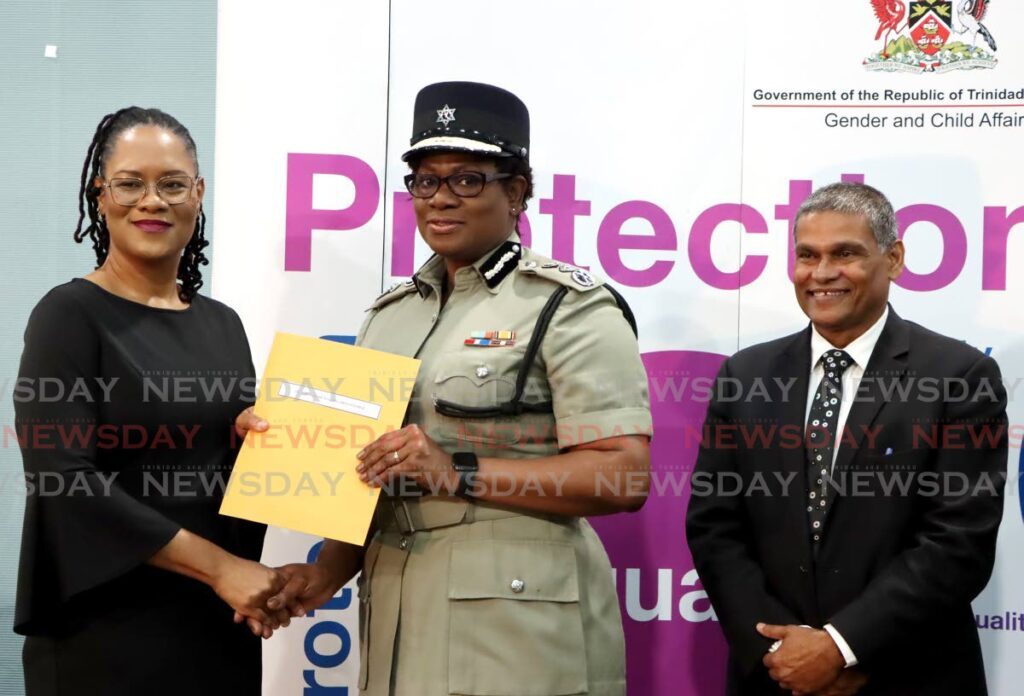NGOs query exclusion from advisory group

AT least one NGO is asking why no civil society organisations were included in the recently formed Women, Peace and Security (WPS) Advisory Group for the Development of a National Action Plan for Trinidad and Tobago and related matters.
The group received its letters of appointment on Tuesday at the Gender and Child Affairs Ministry in St Clair. It was comprised of representatives from the Institute of Gender and Child Affairs, the High Court, the police force, the coast guard, the UN, legal and health representatives, and representatives for the Ministries of Gender and Child Affairs and Social Development and Family Services.
Conflict Women Ltd CEO Asiya Mohammed said, “It is unfortunate that civil society is not reflected on the WPS Advisory Group, because as we know, members of civil society work day in and day out to protect our women who face situations of conflict, rape survivors, domestic violence survivors, etc. It is imperative therefore that the government recognises the important value added by civil society and utilise this to move the country forward, and advance the WPS agenda.”
Asked about the omission, Gender and Child Affairs Minister Ayanna Webster-Roy said the group had the ability to incorporate all of Trinidad, including civil society organisations.
“We have the university on board, we have the judiciary on board, we have the police on board. You may say it’s government, but I would say it’s a wide cross-section of various interests, that’s how I would put it.
“When we had the workshop, it was mainly NGO-led, and it was a deliberate strategy not to pick a particular NGO to be on the board, which is why we gave the board the opportunity to co-opt as many NGOs as possible. We have been working with civil society, but to pick one particular NGO to be on the group, we wanted to give the group the opportunity to engage as many as possible, even if it means all of them.”
She said she wished she had thought of asking opposition members of Parliament to sit on the board.
“At the end of the day, we all are Trinbagonians, regardless of what colour we might wave, and we must all work together to solve national issues.”
Giving the feature address at the distribution ceremony, Webster-Roy said it was no secret that TT was experiencing high rates of armed violence, homicides, femicides, gender-based violence, and other forms of criminality.
“The WPS agenda recognises the role women play as active agents of peace and stability. Women have the power of influence, and as I said on a platform, they must use that power of influence for good.”
She said when she was presented with the concept of (the UN programme) Women, Peace and Security by the Canadian High Commissioner, she said while TT had no armed conflict, the programme could be used to fight gang violence.
“The WPS agenda looks at traditional challenges such as armed conflict, but also non-traditional and emerging threats to health, climate and domestic security, covid19 and other health crises, climate change, threats to cyber-security, trafficking in persons, gun and gang violence and other challenges.”
Webster-Roy said the advisory group will examine extensively the WPS concept in the effort to reduce gun and gang violence. She directed the group to produce a draft national action plan in the next six months.
“Cross-sectoral efforts will be integrated into the gang reduction community programme, and the national action plan for the prevention and reduction of violence using a public health approach. The government seeks to develop synergies between the WPS agenda and its commitment to address the public health dimensions of crime and violence, in keeping with the Caricom regional symposium held in Trinidad last year.”
She said community groups will also be engaged under the key stakeholders, to provide capacity-building support to implement WPS initiatives to specific communities. She said a WPS initiative had been launched in Beetham, and this would be used to adapt and adjust programmes in other communities.
Webster-Roy also asked Trinibad artistes to use their music for good.
“Instead of us talking down to them, we should challenge them to be part of a TriniGlad movement, and put out some positive messages. We might have to bring them on as part of the process and use their image for good.”
Canadian High Commissioner to TT Arif Keshani said work with the Gender and Child Affairs Ministry on the WPS programme began in January 2023, with several key milestones during the year, including an NGO-led workshop. He commended TT for moving so quickly to implement the workshop recommendations and establishing the Cabinet-endorsed advisory committee.
"This will undoubtedly pave the way for other countries in the region to advance their own WPS action plans. We all are very aware of the security challenges facing TT and the region. Canada is a key partner in helping Trinbagonians address these challenges.
"In addition to supporting the government institutions, Canada has for many years, worked and continued to work alongside key security actors and institutions such as the police force, defence force, and coast guard to help build capacity in these institutions. We seek to ensure that a gender-based analysis is applied."
Keshani said the Canadian government firmly believed in gender equality and the empowerment of women and girls.


Comments
"NGOs query exclusion from advisory group"